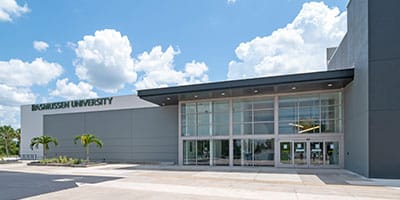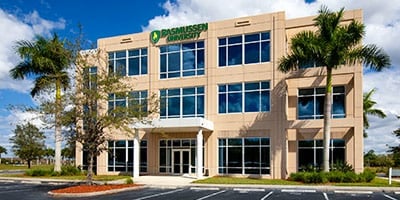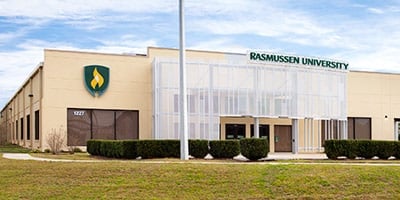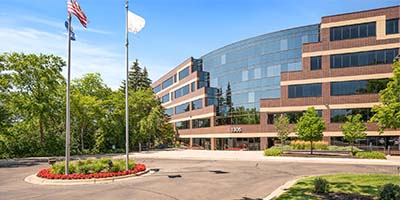
Radiologic Technology
Associate's Degree
- Next Start Dates
- January 05, 2026
- July 06, 2026
ARRT®4 exam prep to help earn radiologic technologist certification and registration
23 courses to complete the Radiologic Tech program
On-Campus and Online Radiologic Tech Programs
In as few as 24 months, you could be ready to work as a radiologic technologist.1 With an Associate’s degree in Radiologic Technology, gain proficiency in diagnostic imaging, medical terminology, physiology and radiation safety, and learn to confidently convey assured leadership with patients. With hands-on experience at clinical sites, on-campus lab, diverse clinical practicum settings and online coursework, you’ll be confident in your skills outside of the classroom and ready to start your career.
Save time and money on your Associate's degree with self-directed assessments. These $149 online, interactive assessments allow you to show that you already achieved the skills and knowledge for a particular course and don't need to take it. We'll provide prep materials and you can work with a peer tutor to prepare at no additional cost.
On This Page:
What Types of Radiologic Technology Classes Will I Take?
Through career-focused curriculum, hands-on opportunities and online flexibility in this Radiologic Technology Associate's degree program, you'll be able to utilize standard X-ray, mobile X-ray and fluoroscopic technologies, along with patient care techniques. Outside of your general education courses, you’ll gain practical, highly trained skills and feel prepared and market-ready to pursue a career as a radiologic technologist.
-
Radiology Physics
- Study how the X-ray circuit creates electrons and the interactions that occur inside and outside the X-ray tube
- Examine the X-ray circuit, X-ray production and photon interactions with matter
- Learn how to prepare for operation of the X-ray control panel and tube
-
Radiologic Positioning and Anatomy I
- Introduce radiography positioning and associate anatomy for the chest, bony thorax, upper extremities and abdomen
- Focus on the foundations of diagnostically sound radiograph positioning
- Study standard routine projections for chest, bony thorax, upper extremities and the abdomen; medical and positioning terminology associated with proper positioning; and complete image analysis
-
Radiographic Evaluation, Disease and Quality Control
- Study the analyzation of radiographic images, and the quality control for radiographic equipment
- Focus on the critical thinking skills required to analyze healthy and diseased images, and make appropriate adjustments as necessary
- Review image criteria, diseases and quality control equipment tests and prepare to critique images, identifying diseases and quality control testing
-
Radiologic Technology Practicum I
- Participate in a clinical education component and experience solid introduction to radiologic imaging in various clinical settings like real radiologic technologists
- Expand and apply knowledge gained in Radiographic Positioning and Anatomy courses, such as operating radiologic equipment and procuring quality radiologic images
Turn Your Associate’s Degree in Radiologic Technology into a Career
We’ve made advancing your education in Radiologic Technology even easier by offering courses and radiology technologists credentials that fit into a busy working schedule. Once you earn your Associate's degree in Radiologic Technology, you can also choose to continue your education by transferring your credits into our Health and Wellness Bachelor’s degree.-
Radiologic Technology
Start your Radiologic Technology degree if:
You’re interested in a fulfilling career that combines technology and direct patient care; specifically, how technology works in the field of radiology and healthcare and makes an impact on patient well-being.
Radiologic Technology Certification:
After graduation, you’ll feel prepared to take the American Registry of Radiologic Technologists (ARRT) exam to earn your national certification examination and registration. Plus, the application fee for the first attempt at the ARRT certification exam is included in the total program costs.2
Radiologic Technology Common Careers:
Radiologic Technologist
Projected job growth:
According to the Bureau of Labor Statistics (BLS), the projected job growth potential by year 2033 for radiologic technologists is projected to grow faster than average at 6%.3
Take the Next Step—Talk to Us!
Tuition Costs & Savings
Do the Math:
With a total of 23 courses, full-time Radiologic Technology students can finish in as few as 24 months1 for an estimated $45,176.
$347 full-time or part-time tuition per credit
x 108 total credits
_______________________
$37,476 total tuition
+ $7,700 total fees
_______________________
$45,176 estimated full-time or part-time total tuition and fees
Learn more about the financial aid cost of attendance (COA).
Other Ways to Save
Higher education should be a manageable investment. Talk to an admissions representative and learn how our Radiologic Technology program is designed to be more affordable with transfer credits, self-directed assessments, loans and grants, scholarship opportunities, and corporate and military grants for those who qualify.
Find more about:
Estimate Your Tuition
Rasmussen University is committed to making education more affordable for all students. Our tuition estimating tool can help you visualize the cost of our on-campus and online programs and see what savings opportunities are available to help you achieve it.
Rasmussen University believes in helping you make your education as affordable as possible.
Our interactive tuition estimator is designed to help you discover how much you could save on a degree from Rasmussen University.
Simply enter your ZIP code, select the program and credential you're interested in, and click “next”.
Right away, you can see the total estimated cost of your selected degree.
As you engage with the tool, you may see this number start to go down.
You also have the option to see how attending full-time or part-time could impact your tuition—and what your tuition estimate looks like, broken down by quarter.
The tuition estimator walks you through a number of ways you could reduce your overall tuition.
Click the tabs or the “back” and “next” buttons to move through the tool.
Within each tab, answer the question shown as accurately as you can, by interacting with the slider, select menu or radio buttons shown.
You might not feel totally confident in all of your answers. That's okay. This tool is just generating an estimate of how much your degree might cost.
The last tab of the tool shows you your results, including how much you could potentially save on your Rasmussen degree.
Remember, the numbers shown here are just estimates, and the true cost of your degree will vary.
Talk with an admissions representative for more information about how to make your Rasmussen degree as affordable as possible.
7 Appealing Advantages of Being a Radiologic Technologist
If you’re ready to upgrade to an extraordinary career, a Radiologic Technology Associate's degree may be the right path for you.
Read more
What Should I Know Before I Enroll?
Entrance Requirements
Entrance requirements for the School of Health Sciences vary by program. To learn more and receive help planning your healthcare education path, contact an admissions representative who will speak to you about immunizations, background checks and entrance exam options.
Transfer Student
We believe in giving credit where it’s due. You can get an estimate of your transfer credits without an official transcript in one business day (on average). Talk to an admissions representative today, or explore our Transfer Policy page for our seamless credit policies designed to maximize credits, potentially save money and expedite graduation.
Help Paying for College
Higher education should be a manageable investment. Talk to an admissions representative and learn how these programs can make it more affordable with self-directed assessments, credit for prior learning, loans and grants, scholarship opportunities, corporate grants and military grants for those who qualify.
Where Can I Find a Radiologic Technology Program Near Me?
At Rasmussen University, we want our courses to be available on your schedule, not the other way around. Select programs are available for enrollment through a specific campus and nationally online, but students complete the courses online and can utilize online and on-campus support and resources.
The degree type can vary based on the state. This is an Associate of Science (AS) degree in FL, and an Associate of Applied Science (AAS) degree in MN.
See below to find out where you can find a Radiologic Technology program near you.
Accreditation
Higher Learning Commission (HLC)
Rasmussen University is accredited by the Higher Learning Commission (hlcommission.org), an institutional accreditation agency recognized by the U.S. Department of Education.
Joint Review Committee on Education in Radiologic Technology (JRCERT)
The following Radiologic Technology Associate degree programs at Rasmussen University are accredited by the Joint Review Committee on Education in Radiologic Technology (JRCERT):
- Eagan campus in Minnesota was granted reaccreditation in 2021 for a period of eight years. https://www.jrcert.org/programs/rasmussen-university-eagan/
- Fort Myers campus in Florida was granted reaccreditation in 2024 for a period of eight years. https://www.jrcert.org/programs/rasmussen-university-fort-myers/
- Ocala campus in Florida was granted reaccreditation in 2023 for a period of eight years. https://www.jrcert.org/programs/rasmussen-university-ocala/
The Radiologic Technology Associate degree program at Rasmussen University’s Central Pasco campus is not programmatically accredited. The Radiologic Technology Associate degree program at Rasmussen University’s Central Pasco campus is seeking programmatic accreditation through the Joint Review Committee on Education in Radiologic Technology.
Joint Review Committee on Education in Radiologic Technology
20 North Wacker Drive, Suite 2850
Chicago, Illinois 60606-3182
[email protected]
312-704-5300
Program Mission Statement
The Rasmussen University Radiologic Technology program is dedicated to educating highly qualified radiologic technologists who possess and safely demonstrate the entry level knowledge, skills and attitude to perform proficiently in various radiology settings.
Program Goals
The accredited Radiology Tech program (online or on campus) will provide a framework of education that reflects the mission and goals of Rasmussen University. It will provide students with the appropriate education and training necessary for the development of skills required to successfully complete the American Registry of Radiologic Technologists (ARRT) competencies, examination, and employment. The objectives of the Radiologic Technology program are to prepare students to become valuable members of a healthcare team by providing quality patient care and diagnostic images. Graduates value critical thinking, effective communication, diverse perspectives and medical ethics as they pertain to the Radiologic Technology profession.
Student Learning Outcomes
Goal 1: Students will demonstrate clinical competence
Student Learning Outcomes:
a. Students will generate diagnostic images applying appropriate exposure parameters.
b. Students will select appropriate radiation protective practices.
Goal 2: Students will demonstrate effective critical-thinking skills
Student Learning Outcomes:
a. Students will revise procedures to accommodate patients in a trauma and mobile setting.
b. Students will model positioning skills and exposure factors to meet patient needs and limitations.
Goal 3: Students will demonstrate effective communication skills
Student Learning Outcomes
a. Students will model effective oral and written communication skills in the didactic setting.
b. Students will comply with the need for effective oral and written communication skills in the clinical setting.
Goal 4: Students will demonstrate professionalism
Student Learning Outcomes
a. Students will value the importance of continued professional development.
b. Students will synthesize professional & ethical behavior in the clinical setting.
View Radiologic Technology Program Outcomes:



